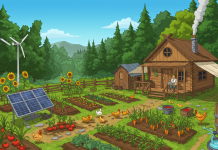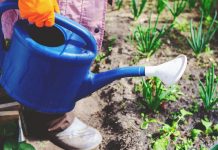Are you a homesteader, farmer, or gardener looking for ways to nourish the soil in your garden and maximize crop yields? If so, you’ve come to the right place!
In this blog post, we will go over exactly what needs to be done to ensure that your soil is in optimal condition so that you can reap the rewards of a bountiful harvest. Keeping up with regular maintenance and taking preventative steps now will save you time and money down the road – let’s get started!
Add Compost to your Soil to Enrich it With Nutrients for Healthier Plants
If you’re looking for a simple way to boost the health of your plants, adding compost to your soil is a great place to start. Compost is a natural fertilizer that is made from decomposed organic matter such as food scraps, yard waste, and cow manure.
This nutrient-rich material adds valuable minerals and micronutrients to your soil which can help plants grow faster, resist diseases, and produce more fruits and vegetables.
Not only is compost environmentally friendly, it is also incredibly easy to make yourself at home by simply setting up a compost bin in your backyard. With just a few simple steps, you can give your plants the nutrition they need to thrive.
Utilize Cover Crops During the Off-Season to Reduce Erosion and Improve Soil Structure
During the off-season, it’s important to consider ways to maintain the health and fertility of your fields. One effective method is to utilize cover crops.
These crops can greatly reduce soil erosion by providing a protective layer for the soil surface during periods of heavy rain or wind. In addition, cover crops have been shown to enhance soil structure by improving water infiltration, increasing organic matter content, and promoting beneficial soil microbial activity.
Overall, incorporating cover crops into your farming practices can have a positive impact on both the short-term and long-term health of your fields.
Install Raised Beds or Contour Swales to Conserve Water and Increase Air Circulation in the Soil
Installing raised beds or contour swales can have significant benefits for your garden. Not only can they help to conserve water, but they can also increase air circulation within the soil. This allows for healthier root systems and can lead to improved crop yields.
By elevating your garden beds, you can also reduce the strain on your back and knees when tending to your plants. And contour swales can aid in directing rainwater towards the roots, reducing the need for manual watering. So if you’re looking for a practical way to improve the health of your garden, consider installing raised beds or contour swales.
Employ Crop Rotation Practices that Allow for Healthy Nutrient Cycles
In agriculture, crop rotation has been a tried-and-tested practice for centuries. It involves the systematic alteration of different types of crops in the same piece of land over a set period in order to help with nutrients replenishment.
It is an essential aspect of sustainable farming that allows the soil to recover from the depletion that occurs when a particular crop is repetitively planted. This ensures the continued productivity and overall health of the land to support future generations.
Generally, crop rotations have been designed to rest, rehabilitate and encourage the growth of soil health in different types of soil on a farm. By utilizing crop rotation practices, farmers can provide farm-to-table food with a greater nutrient value, while maintaining soil fertility and stability.
Invest in Organic Fertilizers and Pest Control Products for a More Sustainable Approach to Farming
Farming is a crucial aspect that sustains human life by providing food. However, it is no secret that traditional farming practices have detrimental effects on the environment. To address this issue, many farmers are incorporating sustainable practices into their operations.
One such approach is investing in organic fertilizers and pest control products. Unlike conventional chemical-based fertilizers and pesticides, organic alternatives do not contribute to the degradation of soil quality or the pollution of water sources. Additionally, organic practices support biodiversity and promote natural pest control, reducing the need for harmful chemicals.
By investing in organic fertilizers and pest control products, farmers can play a role in promoting a healthier and more sustainable planet. Organic fertilizers not only improve soil health but also enhance crop yields while reducing the reliance on synthetic chemicals.
Test your Soil Regularly to Understand its pH Level and Nutrient Composition Better
Testing your soil regularly is an essential practice for every gardener. Understanding the pH level and nutrient composition of your soil is crucial for the health and growth of your plants. Soil that is too acidic or alkaline can have a significant impact on the plants’ ability to absorb nutrients and thrive.
By conducting regular soil tests, you’ll be able to adjust the pH level and add the necessary nutrients to ensure your plants are getting what they need. Whether you’re a seasoned gardener or just starting, testing your soil will not only help you achieve a lush and healthy garden but also optimize the growing conditions for your plants. So, take the time to test your soil regularly, and watch your garden flourish into the oasis you’ve always wanted.
Growing a healthy and sustainable garden is a rewarding yet difficult task. Applying the tips outlined in this blog post, from adding compost to your soil to installing raised beds as well as testing the pH level of your soil, can provide an excellent foundation for creating the gardening oasis of your dreams. By investing in organic fertilizers and pest control products, you can avoid harsh chemicals that can do more harm than good. Additionally, employ crop rotation practices to ensure nutrients are being recycled efficiently and don’t become unbalanced. Utilizing cover crops during the off-season is also essential since it greatly reduces erosion as well as improves overall soil structure. Taking all of these steps will help lead towards creating a luxurious backyard retreat!














